Table of Contents
ToggleEven as a young boy, I loved the rain.
I knew the science of rain, but it didn’t dilute the magic or my fascination. It was a kind of music my heart knew by instinct. It brought me alive.
The moment raindrops began to grace the earth — hugging the trees, kissing the grass — my legs would carry me before my thoughts. With arms flung wide open, I’d run toward the sky, shirtless, barefoot. In the scent of wet soil, in the embrace of cold raindrops, for a moment, I belonged to something that had no language — only feeling. Only freedom.
But today… today is different.
There’s something hauntingly unfamiliar about watching the Bangkok rain from up here — from the 20th floor of my home office window. Lightning turns the downpour into a silver veil draped across the skyline. The storm feels suspensefully distant, yet deeply personal.
Everything feels… melancholic.
As I type, my palms tingle. My feet grow cold. My chest tightens. My heartbeat rises like a quiet drum from a shamanic ritual. A chill travels down my spine.
This is not a story. This is a glimpse into the lived experience of my family — and of myself. And in my family, there is an untouched, ghostlike silence around these incidents. This is the first time I am revealing this part of me.
When I look back at my life, it feels like a dream — I find myself in the dark, naked, walking through a misty, cold, wet forest of rose vines. Not a gentle, sculptured garden — but a wild, tangled expanse of vines, thorns and stems twisting across my path in every direction — a merciless bondage. No escape.
With every step, the rose vines take me hostage. Each thorn draws a fresh wound, deep in the skin, carving new lines of blood — like an abstract painting. A pain not felt in the body, but of the deepest parts of my heart and soul.
And yet, in that same forest, something obvious was blooming. Magnificent roses — velvet red, vibrant, luminous — as if they were trying to signal the way out. Their beauty was undeniable. I saw them. I appreciated them. Yet always at a distance. I could never fully breathe in their fragrance.
As I struggle to find the words to write, I feel like I’m standing in front of the world —
naked in a snowstorm.
Exposed. Unsure. But no longer ashamed.
This is to honor my grandmother — the pain she silently endured throughout her life.
This is the outcome of the healing journey I’ve walked — like a pilgrim returning home, barefoot and changed.
This is the courage to tell the story from a place of resilience — not to seek your sympathy, but to evoke the quiet power in someone who may be silently suffering from a painful past, who is lost, and who is seeking a way through.
I must begin long before I was born into this world. And I warn you: this is not a linear story.
The Final Love Letter from My Grandfather
Her name was Leelāwathi.
To me, she was Āchchi Ammā — my grandmother.
She had the gentlest hands. When I’d lay my head on her lap on the double swing where she sat in the corner, she would caress my hair in slow, loving strokes. She would tell me stories about her past until I drifted to sleep — and even then, her fingers would continue tracing my hair for hours, as if guarding me through my dreams.
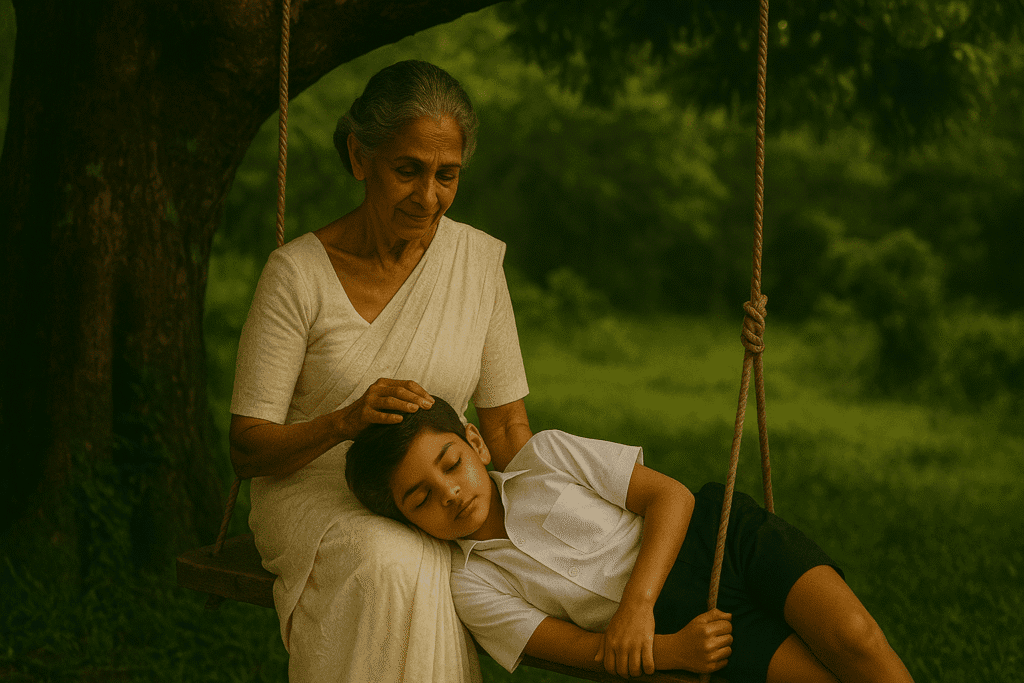
She was soft-spoken. Always. Never once in my life did I hear her speak ill of anyone quite literally — not even those who had caused her pain.
The day she found the letter — the final words of my grandfather — everything in her life changed. And little did she know, the course of her unborn grandchildren’s lives changed with it.
Like a train derailing from its tracks, the collision of that moment sent shockwaves through generations — a domino of invisible explosions no one saw coming.
She already had five children — three boys, followed by two girls. For a moment, their future seemed bright. They could afford it. Life had promise. My mother was the fourth, barely four years old, already living with a rare heart condition that caused oxygenated and unoxygenated blood to mix in her body.
Leelāwathi was in her early twenties. A loving mother. A devoted wife.
A woman living a life that felt — briefly — whole.
Her husband, my grandfather, was a railway engine driver — a prestigious position in mid-century Sri Lanka. He was respected, and his family owned land and farms. They lived well.
She was hopeful. She was joyful. For a fleeting moment, she was fulfilled.
And then one morning, everything slipped from beneath her feet.
It happened without warning — no signals, no omens.
What she thought was a love letter turned out to be a suicide note.
She walked into her bedroom, humming a tune from a popular bioscope film, and saw the letter placed carefully on the dressing table. It looked ordinary from afar — folded with quiet precision, the way she knew her loving husband would.
She picked it up casually, with a smile. She unfolded it.
And then, she froze. The handwriting was unmistakable.
The opening line read:
“My Loving Leela…”
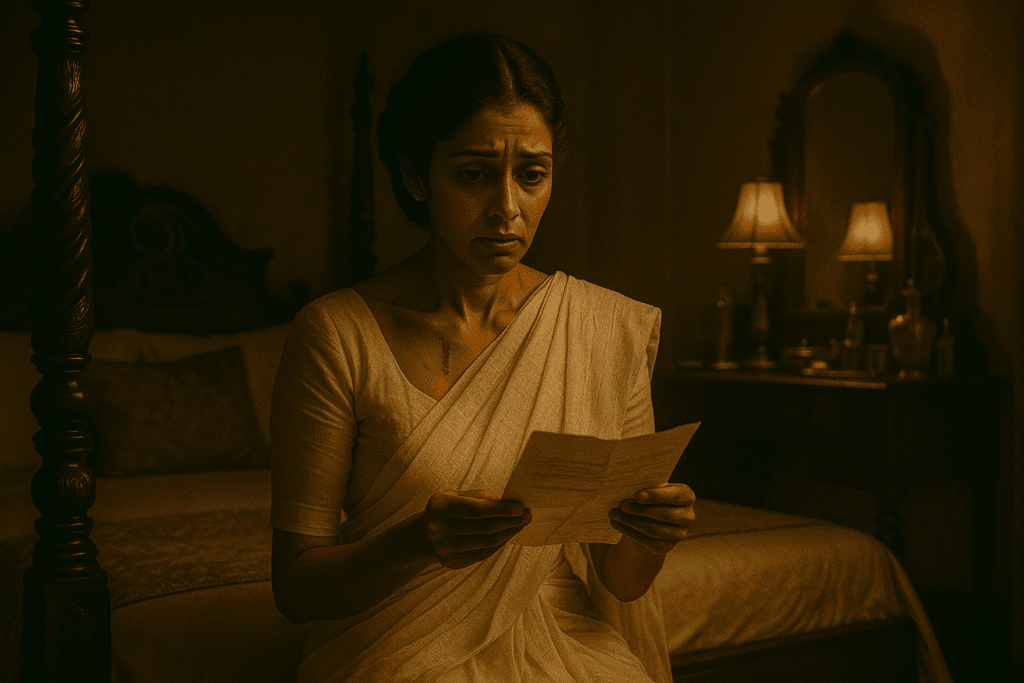
A gulp of heat rose up her throat like lava. Her chest caught fire.
The words blurred. Her world tilted.
No one knows how long she stood there staring at the paper.
The letter wasn’t long, but it carried the unbearable weight of finality – yet infinite.
It started with… “I am unfortunate not to spend the rest of my life with you…”
And ended with “…but I swear to meeting you in every forthcoming life after life.”
He was gone. He had taken his own life.
And to this day, no one knows why.
What followed was not just loss — but erasure.
Leelāwathi and her five children were evicted from their home by his family — who had once embraced her. Once kin, they turned to strangers. Before grief could even settle in, she was homeless. Her world collapsed overnight — from dignity to destitution.
She received nothing. Not a single dime. No pension. No inheritance.
All she had left were the children she bore and the clothes they wore.
But she didn’t fight. She didn’t have the strength. Grief had hollowed her out — and in its place, only one thing remained: The will to raise five children on her own.
They moved into a crumbling house near the railway tracks. The irony was brutal. The sound of trains — once the music of her husband’s work — now echoed through her nights like a haunting refrain. They passed like ghosts.
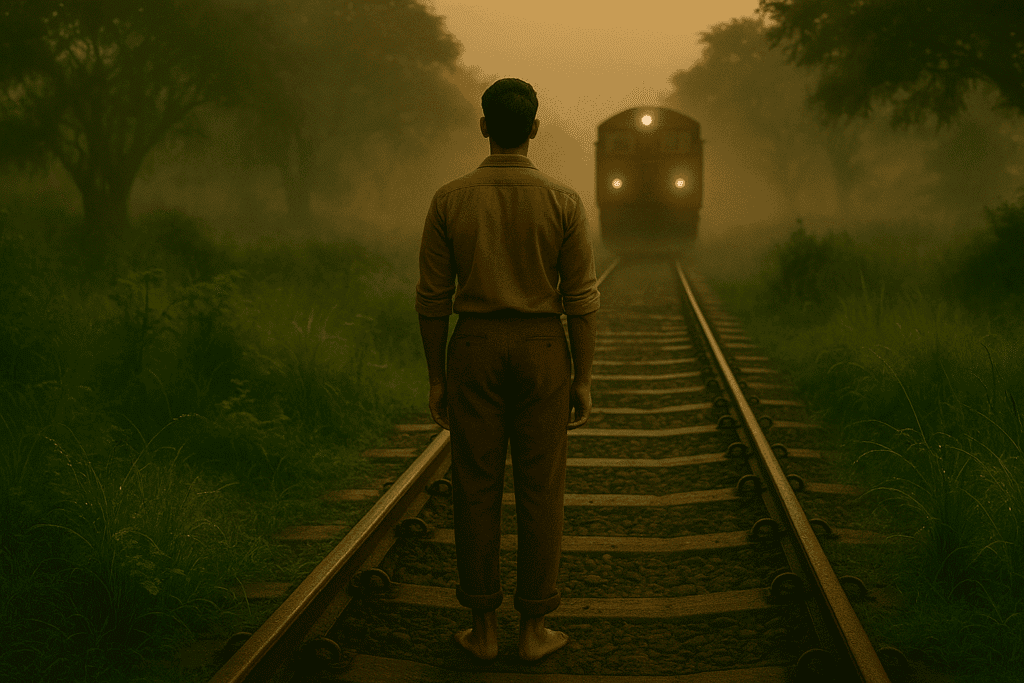
But love for her children lived in her eyes, and determination steeled her spine. She worked endlessly — any job she could find. Writing. Typing. Stitching. Washing dishes and cleaning homes. Every coin was counted. Every sacrifice was made.
The romantic flame she once carried for my grandfather, it was buried with him. She never looked at another man again. When someone showed interest, she disappeared — sometimes quitting a job without notice, sometimes simply never showing up again. The pain in her eyes, and the trembling fingers — they said more than her apprehension to go back to a particular employer – but her lips were sealed, she never said a word.
Even the smallest worry overwhelmed her — if my mother was five minutes late from school, or if the rice tin ran low, she collapsed inward. But she never showed it. She hid her fear beneath her silence, disappeared into work, and soldiered on. She not only raised her own children and watched them fall into a depthless darkness — no matter how hard she tried to rescue them. But she also brought up the scattered grandchildren with divine devotion — and yet again, she witnessed many of my generation stumble into the same shadow.
She gave everything.
And yet, in desperation, she witnessed history repeating itself.
Someone watching from the outside might call it a curse.
And in many ways — it was.
Again and again, Trauma repeating itself, giving meaning to the word ‘curse’.
She feared, she feared everything, everyone. Her body betrayed the sorrow she buried. She would clutch her stomach — often mid-sentence — and rush away in pain. There was a knot in her gut. She never knew when it would tighten, and it did. It was often – too often.
That was how it began in our lineage.
My mother — the same. She feared, she feared everything, everyone.
She inherited the knot.
And later, so would I.
And so did my sister.
That letter was never spoken of again. Not aloud. She kept it hidden, folded neatly, in a small wooden box — the only tangible inheritance my grandfather left behind, apart from the curse that clung to our bloodline.
It became the invisible presence in our home — like an invisible elephant in the room.
It hovered between rooms, tucked inside drawers, lingering in the tremble of Leelāwathi’s voice whenever the past was mentioned.
My grandfather’s final love letter — was more than paper. It was an invisible thread that connected past and the preset, this very moment.
A thread of confusion.
A thread of absence.
A thread of abandonment.
A thread of destruction.
A thread of unspoken questions that shaped how love, grief, and longing would live — or hide — in all of us.
The trauma did not begin with his death. It began with what no one dared to name after it.
I watched it erode my family.
I watched as my uncles deteriorated — one to despair, two to death.
I watched my mother carry her fragility through, how it shaped her marriage, her wellbeing, in every phase of life. And then how it echoed into mine.
I watched the ripple of that silence hurt my cousins, my sister, and me.
That silence was invisible, untouchable. But it was dangerous.
As a young boy, I couldn’t name it. But I felt it — a lingering ache, a quiet sorrow I had no words for. Now I understand. Now I see it clearly. But the sad truth is that it is too late to many – because many of my family is under six feet already – gone too soon. Cursed before they were even born.
A Curse and the Inherited Knot
I’m only just beginning to scratch the surface.
Even with what little I’ve uncovered, I know it would take many lifetimes to tell my story.
And what terrifies me most is not what I know — but what I don’t remember. Let alone what I don’t know — what each of my family members have lived through, and some even taken to their grave.
But this isn’t just my story. It isn’t just my family. This story repeats itself — in different forms, in different homes. May be even in yours. It whispers through generations, takes on new faces, changes names… but the hurt remains. It moves silently, like a curse.
This is the anatomy of inherited grief.
When my grandfather ended his life, the grief didn’t end with him. It overcame my grandmother. It abandoned my mother. It slipped into my uncles’ minds and rewrote them — cell by cell — as if it had the power to script their destiny. It imprinted itself into my mother’s bloodstream. Then it entered her womb. And eventually, it entered me. And my sister.
There were no bruises. No visible wounds.
But there was something else — something far more enduring.
Invisible inner scars that grew in silence.
They have learned how to disguise themselves well — through the evolutionary process.
They showed up not as physical wounds, but as fear.
As the knot in the gut.
As sudden meltdowns. As manic highs and lows. As suicidal thoughts.
The list goes on…
They’re nuanced — these scars.
They don’t scream. They haunt.
They feel like punishment for a crime we never committed.
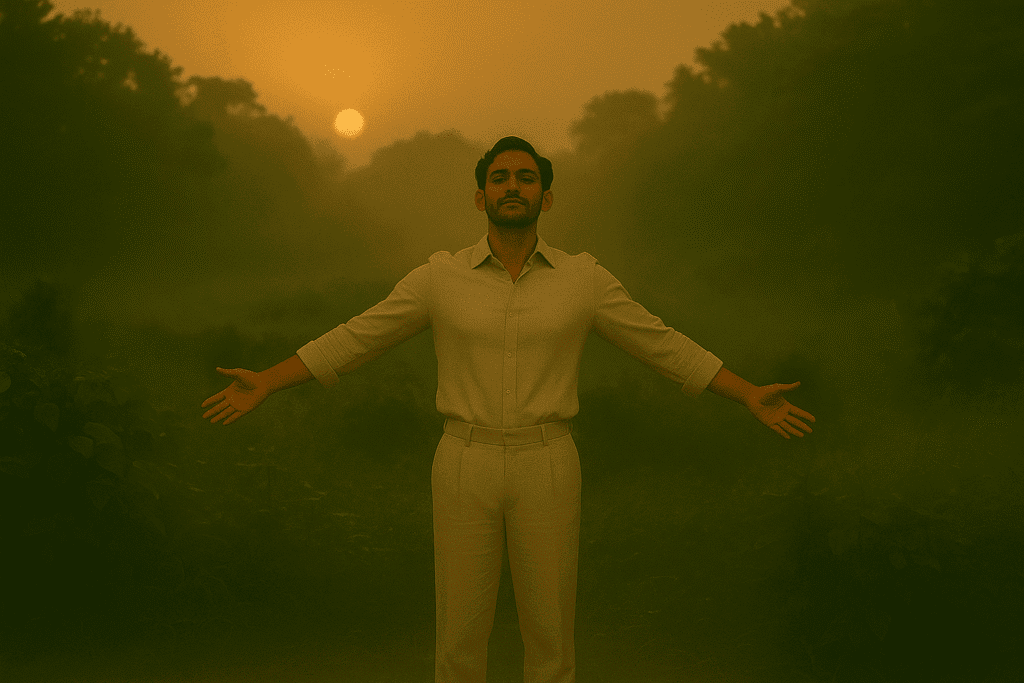
What we now understand through the lens of neuroscience and epigenetics is that trauma doesn’t just live in memory — it lives in the body. Unresolved trauma can alter stress response systems, rewire neural pathways, and even affect gene expression across generations. This is called intergenerational or transgenerational trauma. Studies have shown that children and grandchildren of those who endured significant trauma often display heightened anxiety, emotional dysregulation, and physiological stress patterns — even if the original event was never spoken of. In families like mine, these inherited scars aren’t just psychological; they are biological imprints, passed down silently until someone chooses to name them. In psychological terms, this is called transgenerational trauma — the passing of unresolved emotional wounds from one generation to the next.
We learn how to fear before we are even born.
We learn how to grieve before we learn how to speak.
My grandmother’s pain — the betrayal, the abandonment, the unanswered questions — never found a voice. So her body spoke. Her gut twisted. Her fingers trembled. She feared everything and everyone. And in the latter part of her life, she slowly began to lose herself to Alzheimer’s.
The memories she never dared to speak were the first ones to disappear.
When my mother inherited that fear, it didn’t come with a story — it came as a response.
It arrived unannounced, as if it were her fault.
Vicious. Untraceable.
Sometimes it showed up as a lingering sense that something was always wrong —
a guilt, a shame, an inadequacy… even when there was no visible root.
This is what trauma does when it’s unspoken, unprocessed. It becomes somatic inheritance — passed not only through genetic expression, but also through nervous systems entrained to alarm.
As children, we don’t inherit only our parents’ DNA — we inherit their relationship to danger.
To silence.
To love.
We inherit their survival patterns. And then, unknowingly, we call those patterns our personality. When a trigger appears, we react automatically — because survival responds through us, unconsciously.
Trauma doesn’t express itself in just one way — it adapts. It hides in both what is seen and what is unseen. For some, it’s visible in the body: a flinch, a panic attack, a frozen posture, chronic stomach aches, or even illness. For others, it lingers invisibly — in intrusive thoughts, irrational fears, emotional numbness, or waves of shame that appear without warning. These are not weaknesses or flaws; they are the nervous system’s intelligent attempts to protect us from harm it once couldn’t escape. Trauma responses such as fight, flight, freeze, fawn, or collapse are deeply embedded survival patterns, wired into the brain’s limbic system and autonomic responses. Over time, if left unacknowledged, they become ingrained habits — not just reactions to danger, but the very lens through which we interpret reality. In this way, trauma doesn’t just affect how we feel — it shapes how we live.
In our family, grief didn’t end — it recycled.
It became the unspoken framework for how love was offered, how vulnerability was managed, and how the body braced itself against a world that had once exploded without warning. It was the beginning of a lineage that would confuse emotional repression with strength, and silence with dignity.
Until now.
Because when trauma is finally seen and understood, it can no longer masquerade as fate. It can no longer wear the mask of “this is just how we are.”
What you call a curse — might just be trauma waiting to be named.
And what you call broken — might be the wisdom of your nervous system, doing everything it can to survive a wound that wasn’t yours to begin with.
So this is not just my family’s story.
This is the story of every silent home.
Every letter tucked deep under the mattress.
Everybody that hurts without knowing why.
Trauma healing begins with recognition.
Not everything that looks like mood swings, shutdown, overreaction, or numbness is a personal flaw — often, it’s unprocessed pain repeating itself in disguise. The first step is learning to identify patterns that were once automatic, unconscious survival strategies. When we can name trauma for what it is — and begin to understand its roots — we create the possibility of change.
Through psychoeducation, we begin to make sense of what our body and mind have been trying to tell us. We learn that trauma lives not just in memory, but in the nervous system. That healing isn’t linear, and it isn’t quick — and it certainly doesn’t need to happen in Bali nor be Instagram-worthy.
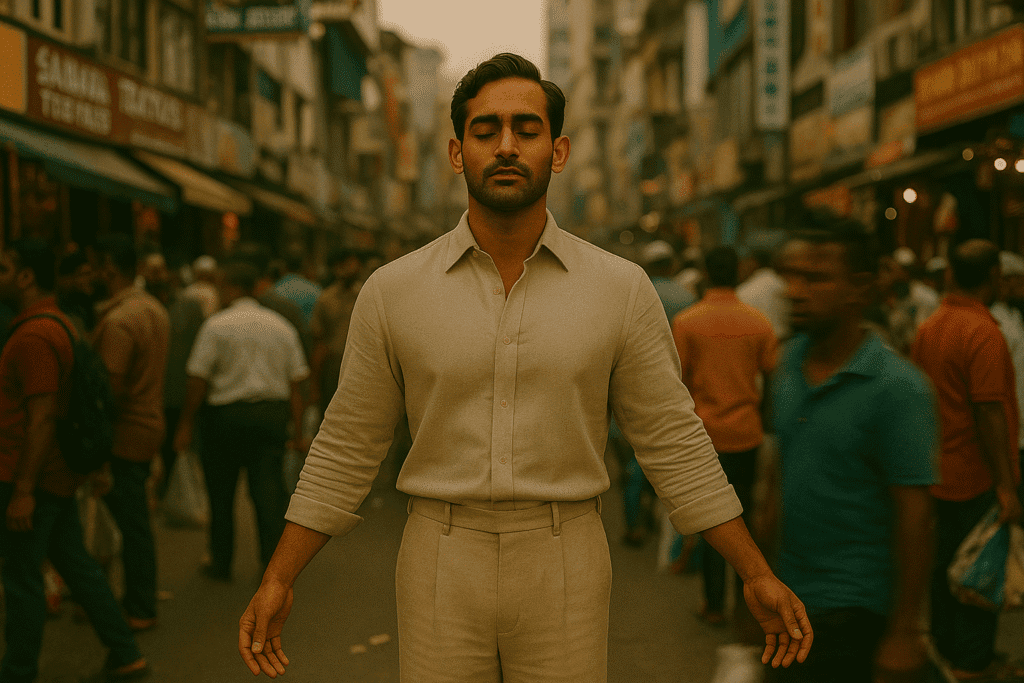
It requires patience and acceptance. Gentleness. And often, qualified support.
Trauma doesn’t dissolve by thinking our way through it. It needs to be felt, processed, and eventually repatterned — through practices that engage both the mind and the body. Trauma informed coaching and psychotherapy, psychedelic integration, somatic work, breathwork, movement, and nervous system regulation are some of the powerful practices to help the body learn that it is no longer in danger.
And healing is not meant to be done in isolation. When we heal alongside those we love, in ecosystems of safety, truth-telling, and consent-based connection, we create environments where trauma loses its grip — and intimacy can finally feel safe.
Relapse can happen. Old patterns can resurface. But with awareness, they no longer define us. Each return becomes an opportunity to deepen the work — not start over.
And the reward? It isn’t just the absence of pain. It’s post-traumatic growth — the emergence of a deeper self, a wider capacity to love, and a fuller sense of aliveness than we may have ever known before.
Healing is possible. Not by erasing the past — but by rewriting our relationship to it.
And in doing so, we don’t just heal ourselves. We heal the future and the past. This is how we begin to heal our ancestors and our unborn children.
This is how the curse ends: No, not with magic.
But with seeing.
With a voice.
With love.
Together.
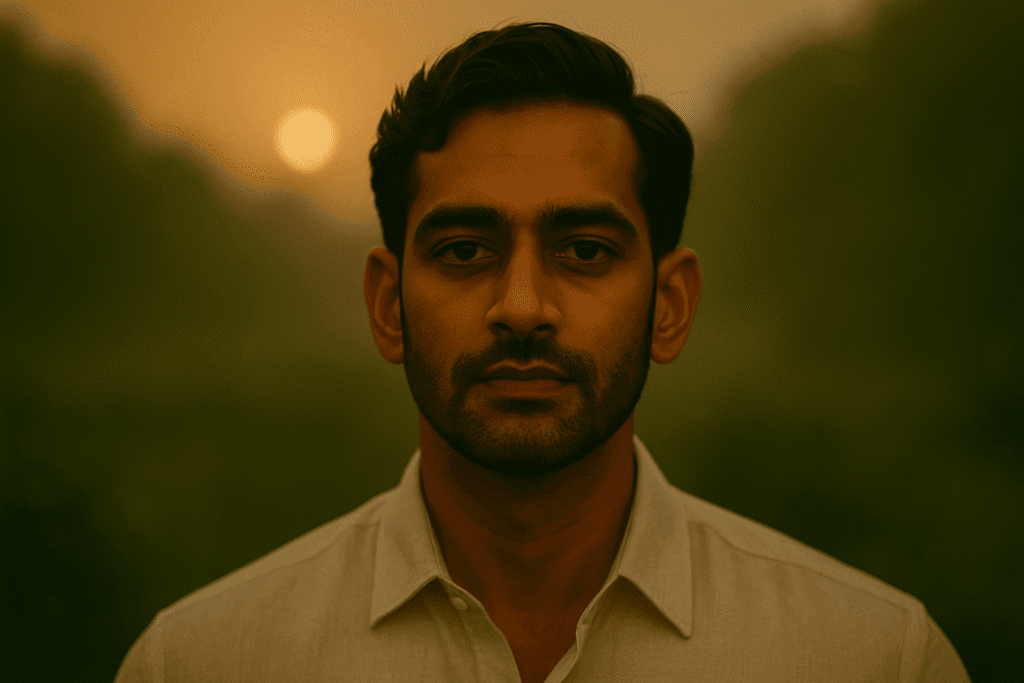
This is only Chapter One of a much larger story — a story of inherited pain, survival, and return.
In Chapter Two, I’ll share the next part of my journey: the uncles we lost, the silence that followed, and how trauma began to shape my earliest understanding of life, death, and despair.
I look forward to walking with you through this next chapter, which I’ll share next week — not just as a continuation of my story, but perhaps as a mirror for your own.
If this chapter reminded you of someone you know — consider sharing it with them.
Someone who may be quietly carrying the weight of family pain they never had words for.
Someone who may have mistaken survival for personality.
Someone who may be hurting, not realizing they’re living inside a story that began long before them.
And if these words stirred something in you — something tender, perhaps long buried — It would be an honor to hear your reflection. Feel free to share your thoughts in the comments below.
Sometimes, your voice becomes the first crack in the silence — the very thing someone else needs to hear to begin naming their own story.
Note on Safety and Support
If you or someone you know is experiencing suicidal thoughts or overwhelming emotional distress, please know: you are not alone, and support is available.
In Thailand, you can contact the Samaritans of Thailand by calling (02) 713-6791 (available 12 PM – 10 PM) or their 24-hour English-speaking emotional support line at (02) 713-6793.
For immediate emergency assistance, contact the Thai mental health crisis line at 1323 — available 24/7.
If you’re outside Thailand, you can visit www.befrienders.org to find emotional support and suicide prevention hotlines in your country.
Reaching out for help is not a sign of weakness — it is an act of courage, and a doorway to healing.

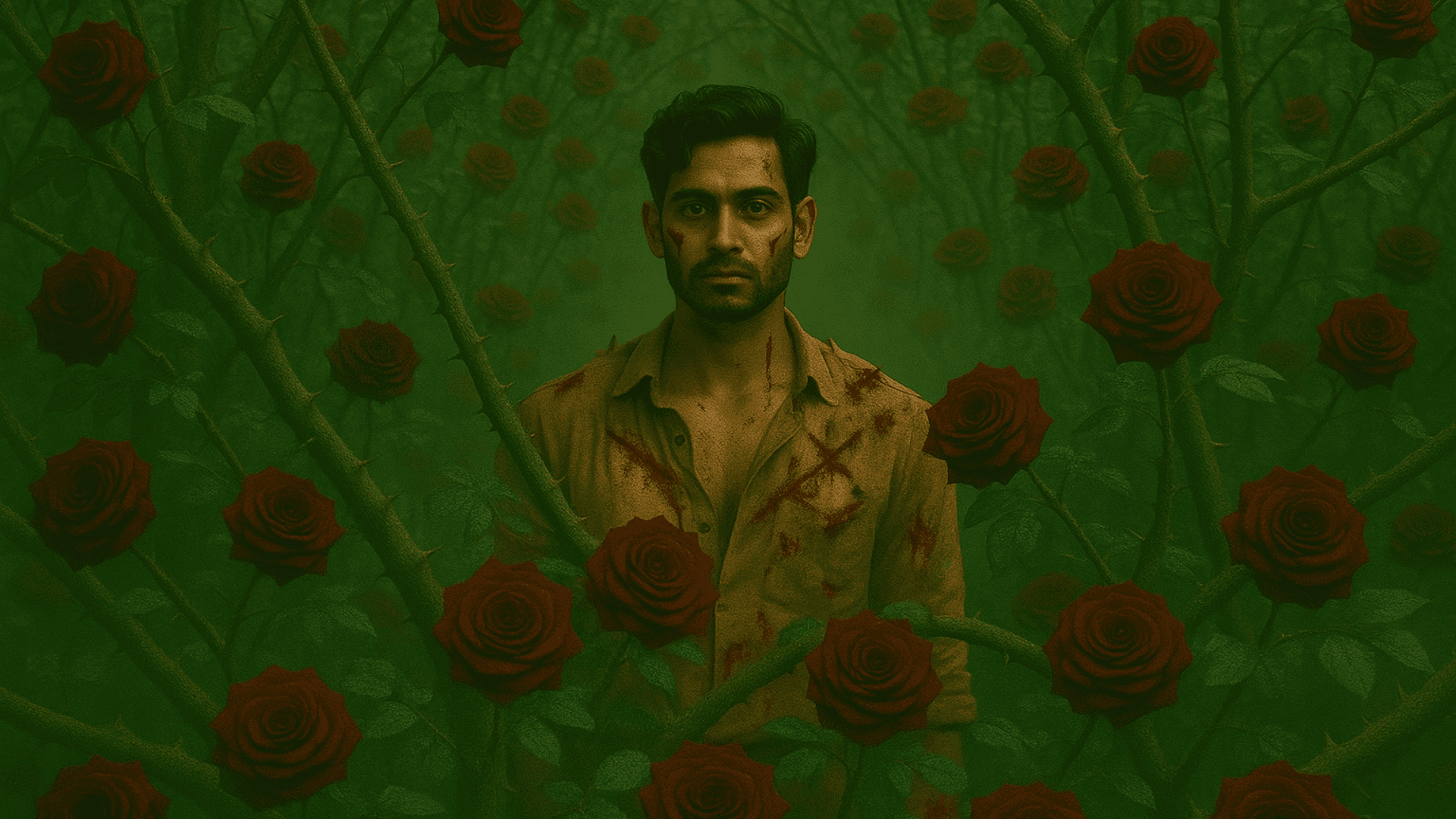


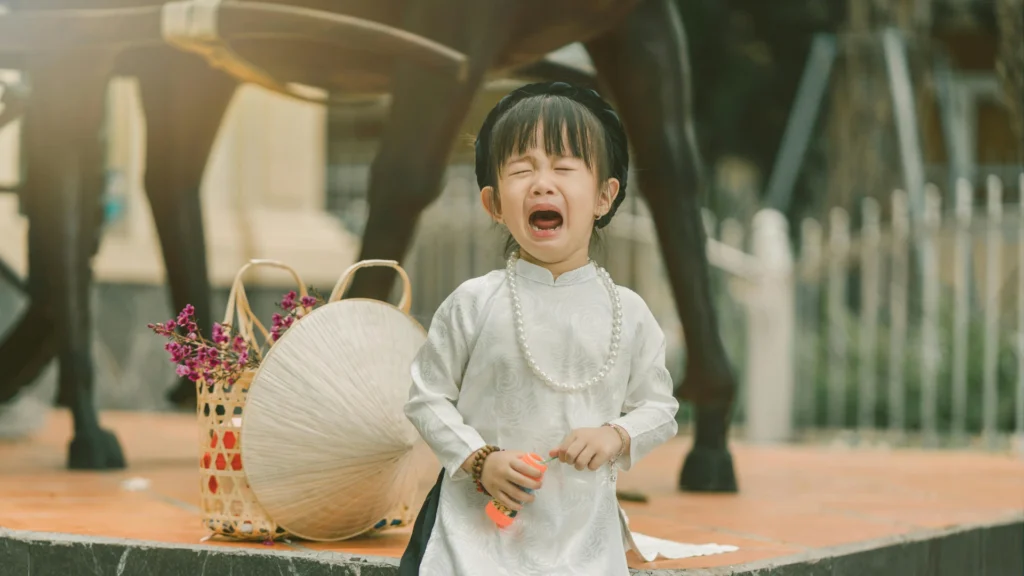



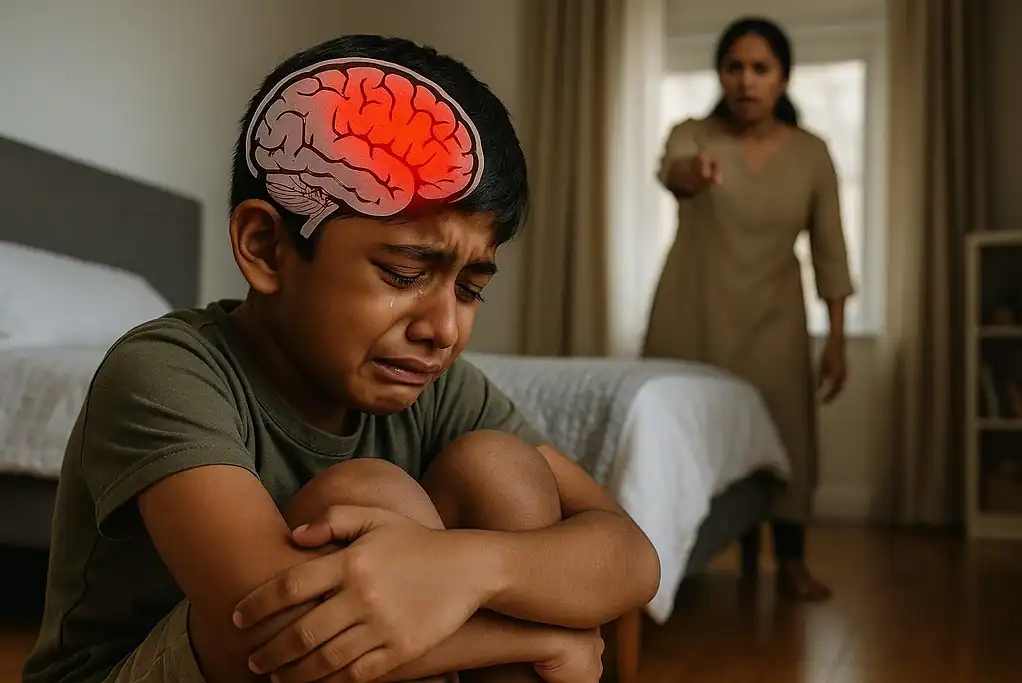

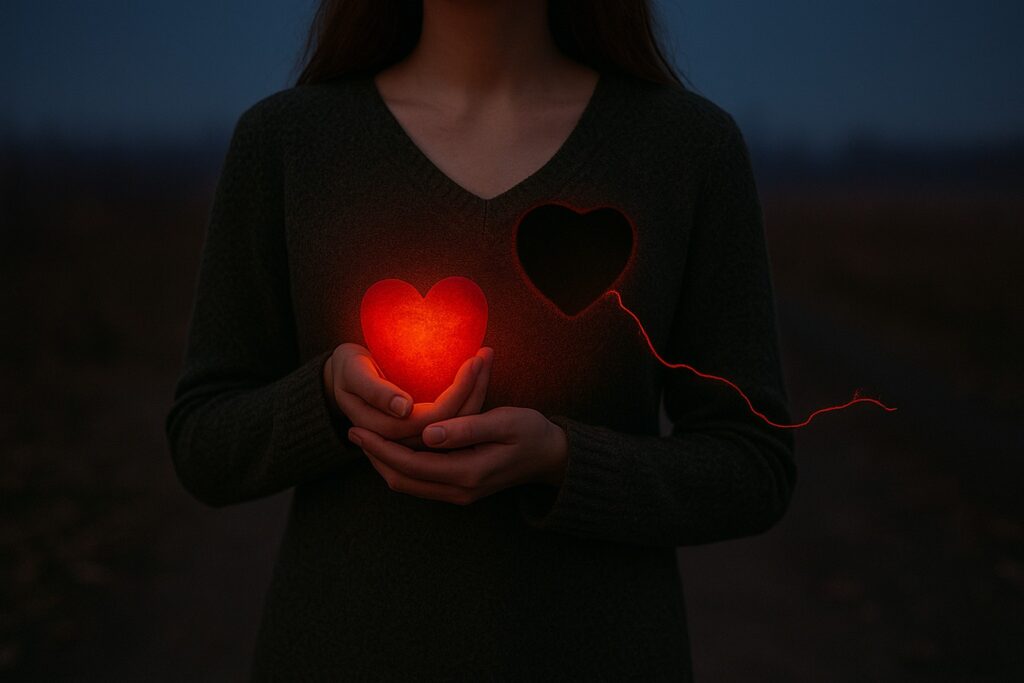

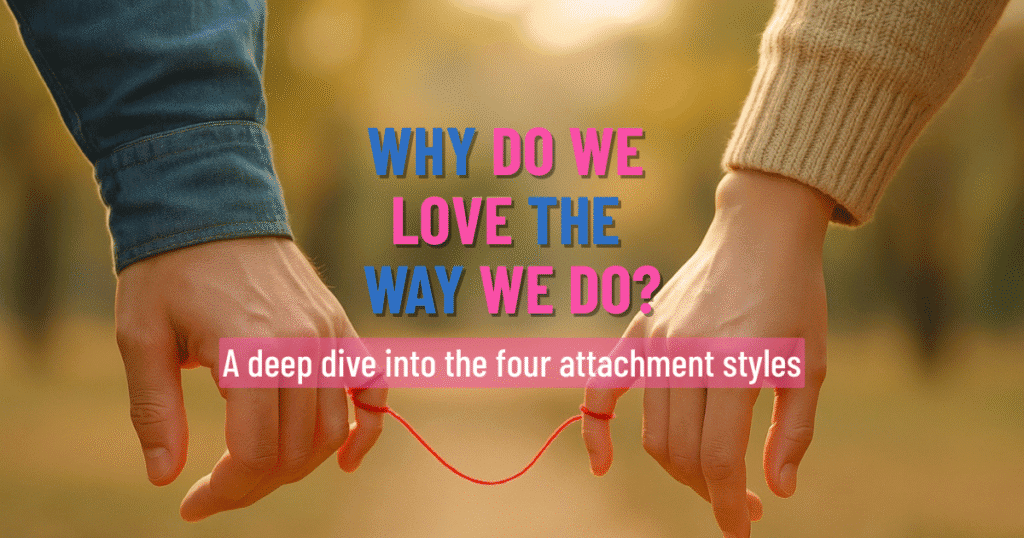
This is deep Fernando and a great eye opener. I had never looked at trauma in this way before. Thank you for choosing vulnerability. I have been truly blessed.
Thank you for the kind words Gochi. I am happy to hear that this invites new perspectives. Sending you my best energy!